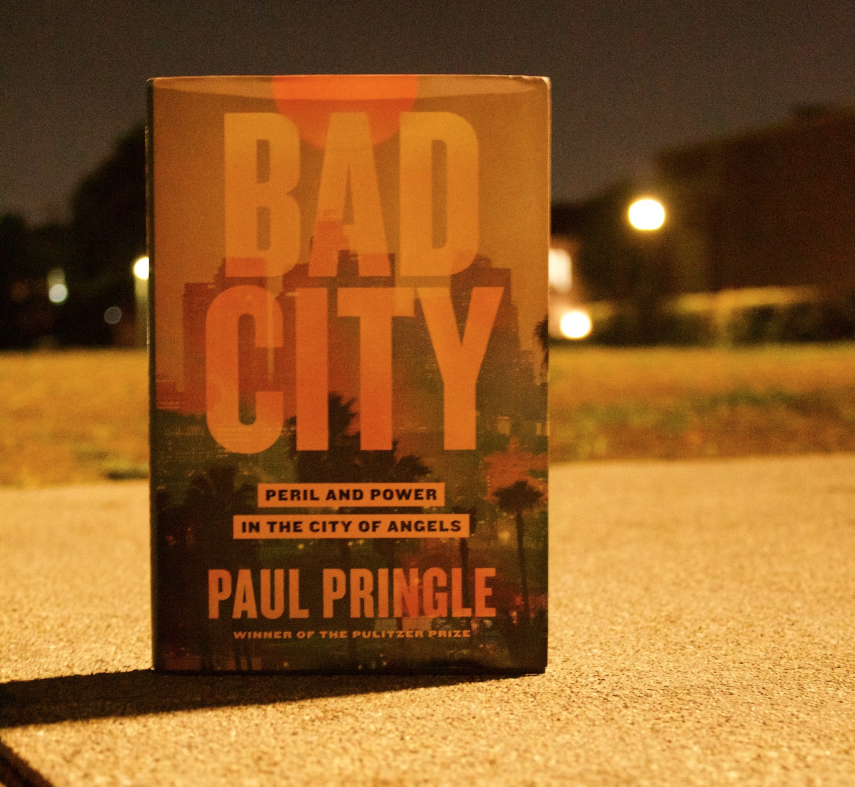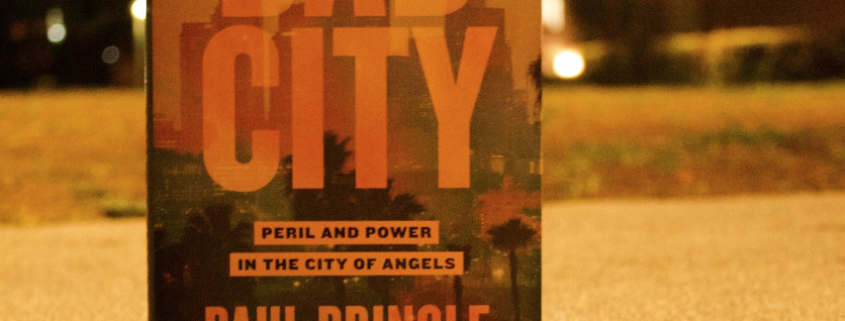New book details how several USC scandals almost went untold

For many years, USC was at the center of a slew of scandals that threw the University into the national spotlight and exposed deep-seated issues within the school administration and culture. In July, Pulitzer Prize-winning Los Angeles Times investigative journalist Paul Pringle released a personal account of the L.A. Times investigations that brought several of these scandals, including the wrongdoings of Carmen Puliafito, former dean of Keck School of Medicine, and former USC gynecologist Dr. George Tyndall, to light.
In his new book, “Bad City: Power and Peril in the City of Angels,” Pringle describes the obstacles he faced — including from his own newsroom editors — and reflects on power and accountability at major institutions, including the Times and USC.
In 2017, the Times spurred headlines around the world with a report uncovering the double life of Puliafito, who resigned the year before. The Times’ report revealed Puliafito partied and took illegal drugs with “addicts and prostitutes,” sometimes in his on-campus office. The report noted Puliafito was respected for his fundraising abilities. During his almost 10 years at USC, he raised more than one billion dollars in donations for Keck and oversaw the school’s seven-spot rise in the U.S. News & World Report medical school rankings.
Following the initial report, stories from the Times continued to expose the extent and consequences of Puliafito’s misconduct. The Medical Board of California revoked Puliafito’s license in July 2018, recognizing Puliafito’s “appalling lack of judgment.”
In “Bad City,” Pringle shares the story of Devon Khan, whose tip started Pringle’s investigation into Puliafito. In 2016, Khan, then a Pasadena hotel manager, sought medical aid for Puliafito’s young companion, Sarah Warren, after she overdosed in a room the two were sharing. “Bad City” also delves further into Warren and her family’s story. Puliafito often delivered drugs to Warren while she was in Orange County drug treatment programs, and the book’s end reveals that her brother continues to struggle with addiction to the drugs and heavy drinking Puliafito introduced him to.
Pringle details why the first news story on Puliafito took more than a year to break, alleging that his former editors, Marc Duvoisin and Davan Maharaj, took lengths to impede his reporting, including spending weeks making superfluous edits, discouraging him from speaking to then-University president Dr. C.L. Max Nikias and withholding the story when it was almost complete.
In the book, Pringle shares suspicions that his editors were influenced by the University’s power and prestige. Conditions got so dire, Pringle recalls, that he and some trusted colleagues, including two Annenberg School for Communication and Journalism alumni, formed a small undercover team to continue the reporting.
“It was very courageous of my colleagues to help me on the story after the initial [story] was killed,” Pringle said in an interview with the Daily Trojan. “They didn’t have to do that. They did it because they’re good journalists. They were determined to do the right thing and to get this information out there, and they succeeded with that. And I’m very grateful for that.”
Pringle also recounts coming up against a “wall of silence” from the University. He received no response the several times he reached out to the Nikias administration about Puliafito, and after one attempted in-person visit, the administration allegedly sent a complaint to Pringle’s editors without Pringle’s knowledge.
After exposing Puliafito’s misconduct, the Times and Pringle went on in 2018 to report on decades of alleged sexual abuse by a former campus gynecologist. Tyndall was accused of frequently touching his patients inappropriately during pelvic exams at the Engemann Student Health Center, where he worked for nearly 30 years. He seemingly targeted students of Chinese descent in later years.
Following the Times’ report on Tyndall, hundreds of former and current female students who had been treated by Tyndall came forward with similar allegations — more than 800 lawsuits alleging the University covered up and downplayed Tyndall’s actions were filed. In March 2021, the University reached an $852 million settlement with 710 women who filed cases, bringing the total payout to Tyndall’s victims to $1.1 billion.
The Puliafito and Tyndall investigations were not the first Pringle had conducted involving the University. Pringle was also part of the Times team that reported on bribes at the L.A. Memorial Coliseum and the following ,dealings between the stadium and University. In “Bad City,” Pringle discusses the troubling culture of silence he saw at the University. During the Coliseum investigation, Pringle recalls experiencing little transparency from the Nikias administration; and from his interactions with an insider source during the time, Pringle concludes employees were reluctant “about publicly knocking the school’s administrators.”
In both the Puliafito and Tyndall cases, complaints were made for years about their behavior, but had been largely ignored or mishandled. The University received complaints about Puliafito before his resignation, but did not take action beyond issuing disciplinary measures and coaching. Complaints about Tyndall stretched back to the 1990s, but he was only suspended in 2016, after nurse Cindy Gilbert reached out to the campus rape crisis center.

“People were hurt,” Pringle said. “Bad things were done, and the institutions responsible for both preventing that or at least correcting it did not do their jobs. That includes USC, that includes the Pasadena Police Department, in my view, the District Attorney’s Office [and] the State Attorney General’s Office. They let these people down in both cases, and it finally took a newspaper to get at least some justice for these people who were denied by these institutions.”
In “Bad City,” Pringle credits the individuals who spoke up and helped move the Puliafito and Tyndall stories forward at the risk of personal consequences and reprisals. The story he tells is full of these “truth tellers,” such as Khan, the Warren family and Gilbert.
“The whistleblowers — this book memorializes their courage,” Pringle said. “They put everything on the line just to do the right thing.”
Although it took some convincing from his literary agent for him to agree to write the book, Pringle said he eventually welcomed the opportunity it presented.
“[In a book], you have the length, the freedom, to tell the complete story and especially with the people involved, the Warren family [and] the whistleblowers like Devon Khan,” Pringle said. “Their stories were not told, what happened inside the newsroom wasn’t told and the experiences that the reporters themselves went through.”
Annenberg professor of communication Robert Scheer said he saw the book as a “teaching moment” for his “Contours of Change and Ethics in Media and Communication” class. He assigned one class the entire book and the other a New York Times review of it.
Scheer said he believes the book highlights, among other lessons, the importance of press freedom. Scheer has worked as a journalist for more than 30 years — including time spent working for the L.A. Times — and has taught at the University for more than 20 years.
“I have a lot of affection about USC, and I think we have great students and we have a strong faculty,” Scheer said. “But we have been at the center of horrible scandals and betrayals of trust. The book hits a number of them, quite accurately. The reporters who worked on the story, including the author of the book, deserve a lot of credit. This is a reminder of the importance of local journalism.”
Maximilian Brichta, a teaching assistant for Scheer’s “Contours of Change and Ethics in Media and Communications” class, said he was familiar with Puliafito and Tyndall before the book was published, but said the class discussion developed his understanding of the scandals’ enabling factors.
“You got to ask, ‘[Are] these different departments responsible for it?’” Brichta said. “You do not know what knowledge was known to people outside of these departments, particularly up the chain of command, all the way up to, at the time, President Nikias. Without knowing that, it’s hard to say how much of this is a USC-wide cultural, systemic issue. I’m unsure of the facts there, and I think a lot of folks aren’t sure of the facts there because there has been a lack of transparency of who knows what, when.”
Brichta said the discussion based on the book also prompted him to think more critically about the University administration and the effectiveness of guards against corruption and unethical behavior. He specifically mentioned the investigation the University launched into Puliafito following the Times’ report, which was led by a former U.S. attorney, Debra Wong Yang, whose ties to the University were questioned in “Bad City.” The investigation was never made public.
“USC is a private institution,” Brichta said. “It makes me question how well suited this self-contained system in keeping a check of power on itself, when there seems to be a conflict of interest baked into the very investigation of its own faculty.”
Brichta said he believes the University administration is still lacking in transparency and urgency when it comes to issues pertinent to the USC community, citing the University’s delayed response to drug-spiking allegations at fraternities last October as another recent case.
Considering Puliafito and Tyndall’s wrongdoings were allowed to continue for so long, Brichta said he believes trust will be hard for the University to restore. However, as years pass and students cycle through the University, Brichta said he does worry that these events and the issues they raise may be forgotten too soon.
“The University has historically made it seem like there’s nothing to see here,” Brichta said. “To me, a matter of a few years can’t restore that trust in the public imagination for anybody who’s actually paying attention to this. But again, I came in 2019 at the heels of all this. When you have a turnover rate that’s baked into the system, like [in] universities, it’s easy to forget. It’s easy to say that we’re starting from a clean slate.”
For the Record: Since the book was published and the Daily Trojan story was written, disputes have arisen regarding the accuracy of how internal processes at the Los Angeles Times are represented by the author.

